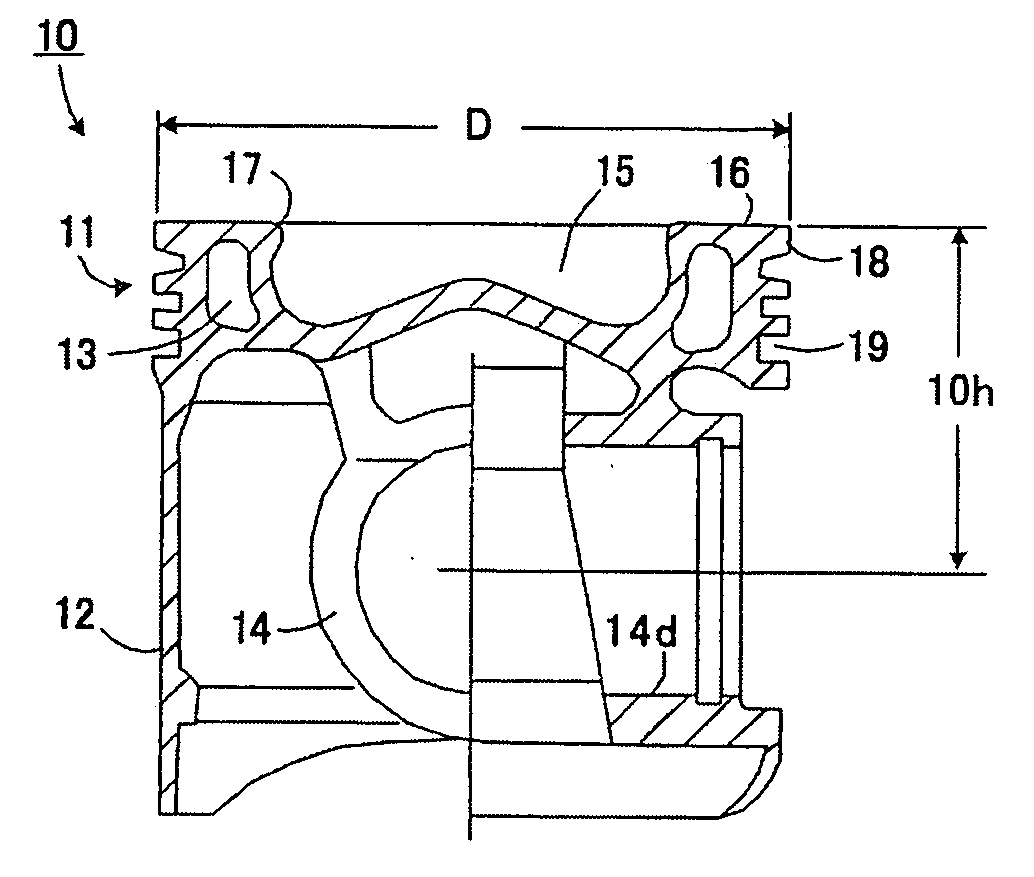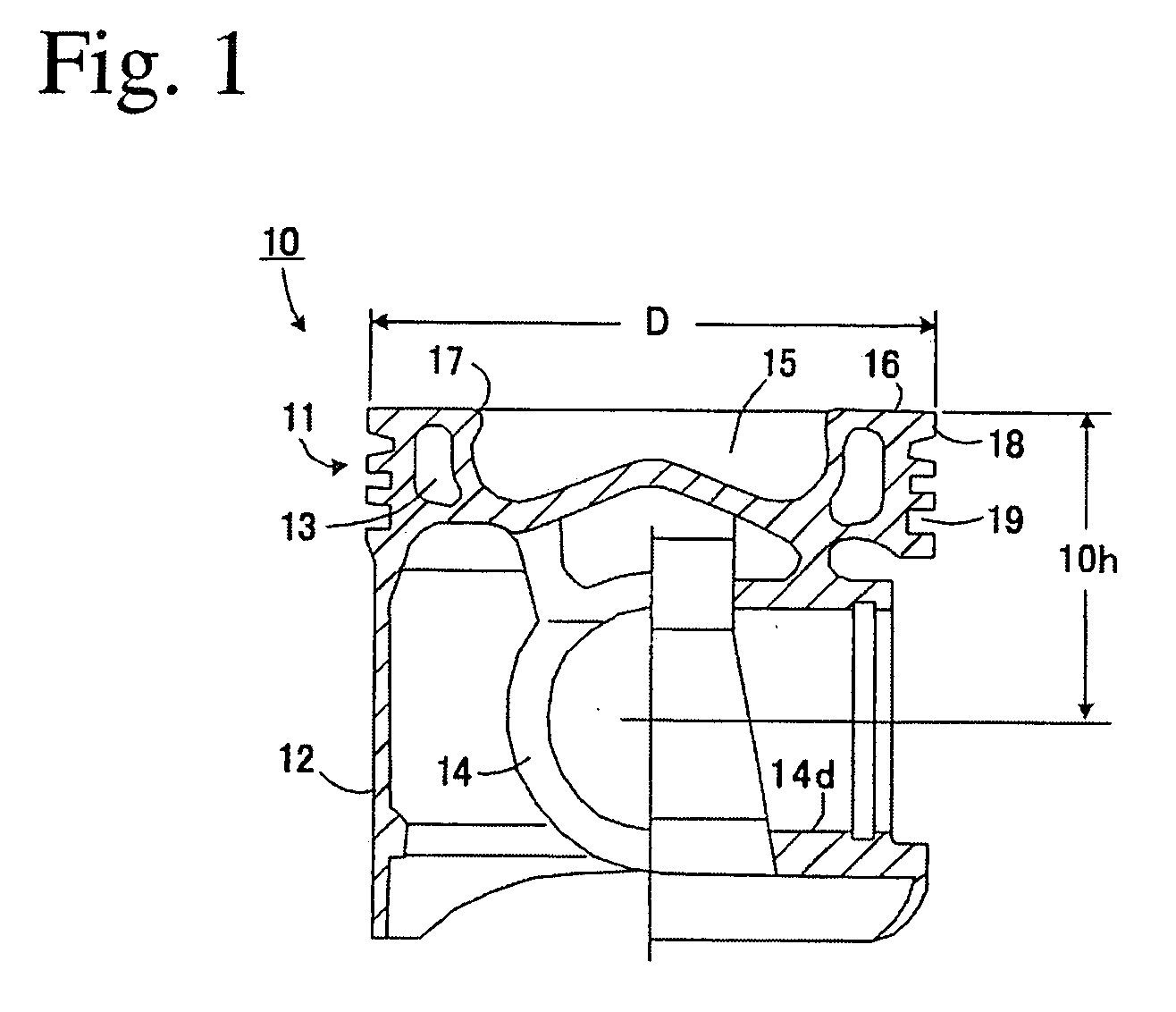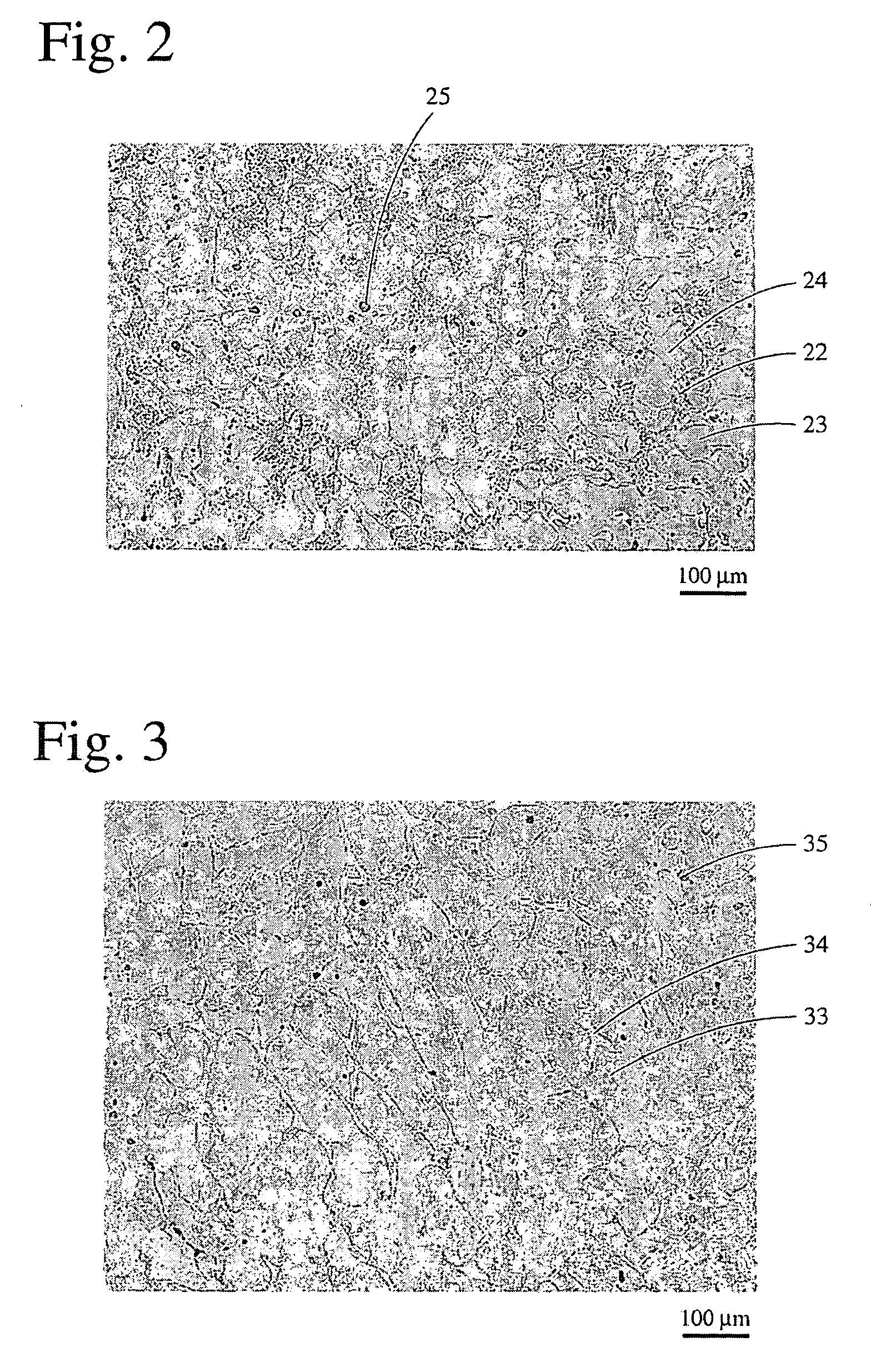Internal engine piston and its production method
a technology of internal engine and production method, which is applied in the direction of machines/engines, foundry patterns, foundry moulding apparatus, etc., can solve the problems of accelerated wear, seizure and scuffing, thermal cracking in lips, etc., and achieves good high-temperature yield strength, high temperature rigidity, and seizure resistance. , the effect of suppressing the adhesion of matrix phases
- Summary
- Abstract
- Description
- Claims
- Application Information
AI Technical Summary
Benefits of technology
Problems solved by technology
Method used
Image
Examples
examples 1-20
, COMPARATIVE EXAMPLES 1-4, CONVENTIONAL EXAMPLES 1, 2
(1) Production of Samples
[0076] Table 1 shows the chemical compositions (% by mass) of samples used in Examples and Comparative Examples. The samples of Examples 1-20 were made of α-P cast steel having a small Cr content (within the composition range of the present invention), and the samples of Comparative Examples 1-4 were made of α-P cast steel outside the composition range of the present invention. Comparative Example 1 used cast steel containing too little Nb, Comparative Example 2 used cast steel containing too much Nb, Comparative Example 3 used cast steel containing too much S, and Comparative Example 4 used cast steel containing too little Nb and too much S. Conventional Example 1 used spheroidal graphite cast iron (JIS FCD 600) disclosed in JP 10-85924 A, and Conventional Example 2 used forged steel disclosed in U.S. Pat. No. 5,136,992.
[0077] Each cast steel of Examples 1-20 and Comparative Examples 1-4 was melted in...
examples 21-45
, COMPARATIVE EXAMPLES 5-11
(1) Production of Sample
[0123] Table 5 shows the chemical compositions (% by mass) of samples used in Examples and Comparative Examples. The samples of Examples 21-45 were δ-M cast steel having a large Cr content within the composition range of the present invention, and the samples of Comparative Examples 5 -11 were δ-M cast steel outside the composition range of the present invention. Comparative Example 5 showed cast steel containing too little C and S, and Comparative Examples 6 and 7 showed cast steel containing too little C and too much S. Comparative Examples 8-10 showed cast steel containing too much S, Comparative Example 11 showed cast steel containing too little Nb, and Comparative Example 12 showed cast steel containing too much Nb.
[0124] Each cast steel of Examples 21-45 and Comparative Examples 5-11 was melted in a 100-kg, high-frequency furnace with a basic lining, poured into a ladle at 1550° C. or higher, and immediately poured into a o...
example 46
[0157] Using a martensitic cast steel comprising 0.24% by mass of C, 0.61% by mass of Si, 0.57% by mass of Mn, 3.87% by mass of Ni, 15.92% by mass of Cr, 2.99% by mass of Cu, 2.10% by mass of Nb, and 0.072% by mass of S, the piston 10 shown in FIG. 1 was integrally cast. This piston 10 comprised a head portion 11, a skirt portion 12, a cooling hollow portion 13, a pin boss portion 14, a pin-engaging inner surface 14d, a combustion chamber 15, a top surface 16, a lip 17, a top land 18, and ring grooves 19. 10h denotes a compression height, and D denotes an external diameter.
[0158] The properties of the above cast steel were as follows: [0159] Area ratio of eutectic carbides: 7.7%. [0160] Average corresponding circle diameter of eutectic carbides: 2.0 μm. [0161] Number of eutectic colonies having an area of 50 μm2 or more: 50 / mm2. [0162] Pin seizure resistance (number of wear): 561. [0163] Liner seizure resistance (seizure load): 130 kgf. [0164] Area ratio of sulfides: 0.7%. [0165] R...
PUM
| Property | Measurement | Unit |
|---|---|---|
| Temperature | aaaaa | aaaaa |
| Temperature | aaaaa | aaaaa |
| Temperature | aaaaa | aaaaa |
Abstract
Description
Claims
Application Information
 Login to View More
Login to View More - R&D
- Intellectual Property
- Life Sciences
- Materials
- Tech Scout
- Unparalleled Data Quality
- Higher Quality Content
- 60% Fewer Hallucinations
Browse by: Latest US Patents, China's latest patents, Technical Efficacy Thesaurus, Application Domain, Technology Topic, Popular Technical Reports.
© 2025 PatSnap. All rights reserved.Legal|Privacy policy|Modern Slavery Act Transparency Statement|Sitemap|About US| Contact US: help@patsnap.com



